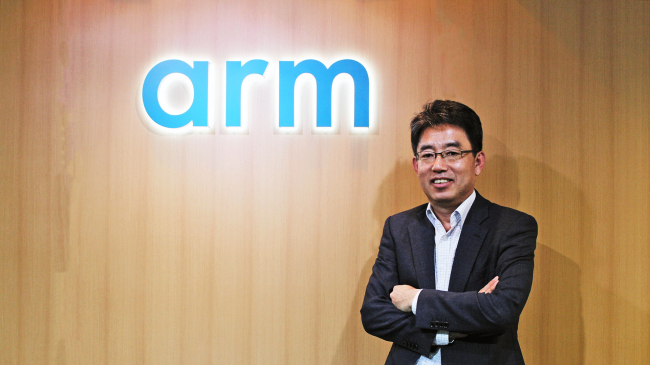The Korea Herald is publishing a series of articles dissecting the status and plans of South Korea’s leading semiconductor businesses that are shifting the shape of the global market. This is the fifth installment. -- Ed.
The upcoming era of the Internet of Things is forecast to require a high level of collaboration among chipmakers, software developers and device manufacturers, according to the head of Arm Korea, a computing chip intellectual property company based in Seoul.
To connect objects and mobile devices to the internet, standardized platforms -- like Arm’s Mbed Cloud -- that are widely accessible to any company and related software solutions will be needed. Therefore, there are ongoing discussions across industries, such as the one led by the Open Connectivity Foundation.
As Cambridge-based Arm is a leading chip IP business that provides its IP for over 95 percent of smartphones sold around the world, the company believes it can be at the center of the move to standardize IoT solutions and platforms.
“Openness and standardization will be crucial for the building of IoT infrastructure, and Arm is hoping to be an enabler for various companies and industries, since our computing IPs are used as the default in various devices,” said Leem Jong-yong, CEO of Arm Korea, in an interview with The Korea Herald earlier this month.
 |
Arm Korea CEO Leem Jong-yong poses at his office in Bundang, Gyeonggi Province, on Nov. 9. (Arm Korea) |
”As the number of IoT devices rises, there will be more embedded chips and operating solutions, traditional chipmakers will see new opportunities to work with device makers and service providers to enable IoT services,” he added.
Leem, a former researcher at Samsung Electronics, led the launch of Arm Korea in 1997. The veteran chip expert persuaded Arm’s head office in the UK to open an office in Korea, the world’s No. 1 chip manufacturing country.
Since its establishment in 1990, Arm has been well-known in the semiconductor industry, but obscure outside.
Arm rose to global fame last September when it was acquired by Japan’s SoftBank Group, which has its eye on the IoT market.
SoftBank Chairman Masayoshi Son forecast in a keynote speech last year that as many as 1 trillion devices will be connected to the internet in the next 20 years.
Son’s acquisition has been a catalyst for Arm to lead the IoT world by providing integrated IoT solutions including sensors, operating systems, telecommunications and security frameworks, which are compatible among smartphones, PCs, home appliances and automobiles.
“We launched IoT Solution Group last year to provide such solutions,” he said. “What we are trying to do is to develop software packages that will operate on the devices containing Arm’s IPs and help our customers deliver services to users.”
According to Leem, Arm is not simply focused on profit-making. It has also supported chip and device manufacturers by providing its specialized computing IPs for mobile devices.
“It has been difficult for IP companies like Arm to make long-term investments, but since Chairman Son acquired Arm, things are changing,” Leem said. “Investments in IoT solution technologies are being made aggressively with long-term perspectives.”
“It is encouraging to see such change, because establishing IoT infrastructure is not only taking money but also significant time,” he added.
IoT is still in the conception stage, with few home utility controllers, appliances and devices being connected. It will take at least 20 years to lay the ground for the real beginning of IoT, Leem said.
“Having around 1 trillion won IoT devices as Son said will just be the groundwork,” Leem said. “Smartphones will be one of those many IoT devices, while your TVs at home will also serve as an IoT device, playing a number of different roles.”
As the variety of connected devices is expected to increase, Leem believes security risks will proportionately increase, which will require common security principles across industries.
“Last year, the malware Mirai started attacking servers of IoT companies, which halted Twitter and Netflix services,” he said. “If DDos hackers had targeted PCs in the past, latest malwares are targeting IoT devices that are more vulnerable to security risks than PCs.”
Arm recently introduced Platform Security Architecture, which provides additional security protection for devices that use Arm’s IPs and solutions.
“When IoT becomes part of our daily life, users, service providers and IP companies need to increase their awareness about security risks.”
By Song Su-hyun (
song@heraldcorp.com)





![[Exclusive] Hyundai Mobis eyes closer ties with BYD](http://res.heraldm.com/phpwas/restmb_idxmake.php?idx=644&simg=/content/image/2024/11/25/20241125050044_0.jpg)
![[Herald Review] 'Gangnam B-Side' combines social realism with masterful suspense, performance](http://res.heraldm.com/phpwas/restmb_idxmake.php?idx=644&simg=/content/image/2024/11/25/20241125050072_0.jpg)

